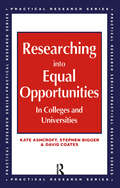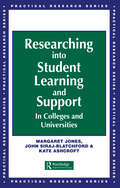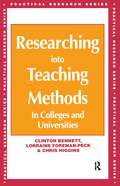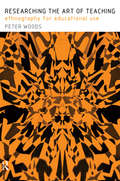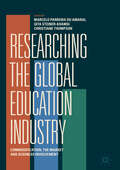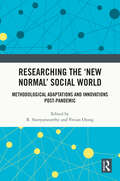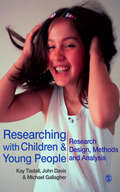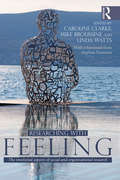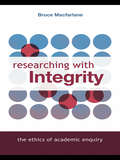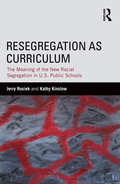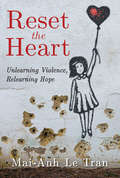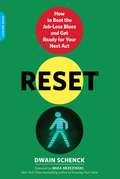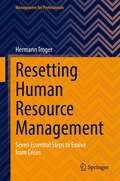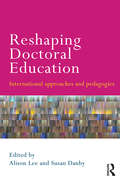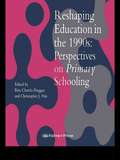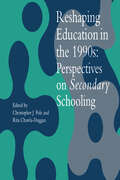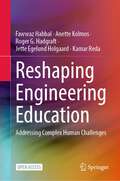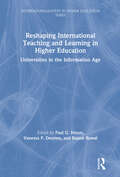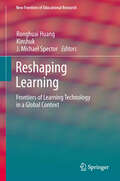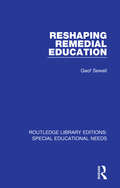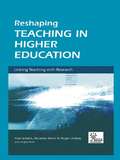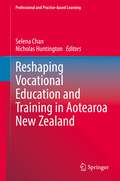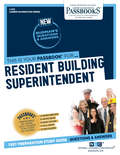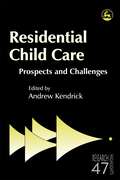- Table View
- List View
Researching into Equal Opportunities in Colleges and Universities
by David Coates Stephen Bigger Kate AshcroftThis work explores the issues, dilemmas and situations which confront the stakeholders in further and higher education in the area of equal opportunities. Such dilemmas include ways that gender influences male and female students' experience and special education needs of students.
Researching into Student Learning and Support in Colleges and Universities (Practical Research Ser.)
by Jones, Margaret Siraj-Blatchford, John (both Lecturers, Westminster College, Oxford University)This work looks at the issues of student learning and support, in the context of their own institution. Issues covered include student representation, underachievement and the overall aims and ethics of further and higher education.
Researching into Teaching Methods: In Colleges and Universities (Practical Research Ser.)
by Bennett, Clinton Foreman-Peck, Lorraine Higgins, Chris (All Senior Lecturers, Westminster College)This is one of a series of short, practical guides aimed at lecturers and tutors in colleges and universities, to help them get started on research. It covers all aspects of teaching methods, strategies for interactive teaching methods, small and large group teaching and student learning.
Researching the Art of Teaching: Ethnography for Educational Use
by Peter WoodsThis book is a follow-up to Inside Schools. It reviews the position of ethnography in educational research in the light of current issues and of the author's own research over the past ten years. Starting from an analysis of teaching as science and as art, Peter Woods goes on to review the general interactionist framework in which his own work is situated, and how this relates to postmodernist trends in qualitative research. The approach is illustrated through reference to the author's own personal history and research career, and his recent research on creative teaching, critical events, and his teachers reactions to school inspections. How to represent such research is a central feature, and includes a consideration of the tools used in that task and how they relate to the ethnographer's self, whatever forms of representation are selected, however, the audiences' own concerns will guide them in their interpretation of the work.Prominent themes include:* the person of the ethnographer in research* the art of teaching and new ways of representing it, while not forgetting the science of teaching and of research* research for educational use, and the uses of educational research* collaborative work between researchers and teachersThe issues covered include such matters as research purposes, research design, research careers, access, data collection, data analysis, truth criteria, the relationship between theory and research methods, writing-up, and dissemination.
Researching the Global Education Industry: Commodification, the Market and Business Involvement
by Christiane Thompson Marcelo Parreira do Amaral Gita Steiner-KhamsiThis book examines how the Global Education Industry (GEI) has brokered, funded, and implemented new conceptualizations of ‘good’ education. With a focus on new private providers and policy actors in education, the authors of the book analyze the impact of the GEI on educational research, policy and practice. How did philanthropies and foundations manage to make their voices heard in school reform debates, what are the implication of digital technologies and data infrastructures on teaching and learning, and should the fast advance of the GEI be merely seen as a logical consequence of the commercialization of education? Moving beyond single-country case studies, the book focuses on key issues related to the study of the Global Education Industry in an international context, discussing the rationales, processes and impacts of current developments. This comprehensive book will be of interest and value to scholars and researchers of the GEI, as well as policy makers.
Researching the ‘New Normal’ Social World: Methodological Adaptations and Innovations Post-Pandemic
by R. Sooryamoorthy Vivian OjongThis edited volume focuses on the changing research methodologies in social science research, prompted by the new social world shaped by the pandemic. It explores adaptations and developments to meet the demands of transforming social circumstances and showcases innovative alternative approaches. Featuring a range of international and interdisciplinary contributors who discuss the context of social science research in the "new normal", the book sets out the need to redesign research to address present-day challenges for the post-pandemic. Chapters share methodological innovations and demonstrate how applicable these new and adapted methodologies are to a world post-pandemic, discussing a wide range of innovative, digital-first research methods with practical analysis. The role of technology and its application in social science research during this transition is explored in particular, alongside new approaches to quantitative and qualitative research that feature innovations in ethnography, online data collection, and ethical protocols for research. Ultimately offering a comprehensive exploration of adaptive and innovative social science research methodologies suited to the current social context, the book will be relevant to researchers, academics, and scholars in the fields of research methods, research technologies, and the sociology of education.
Researching with Children and Young People: Research Design, Methods and Analysis
by Michael Gallagher John Emmeus Davis E Kay Tisdall′This text will be of great use to postgraduate researchers in education, social work and nursing, and any practitioner involved in carrying out research with children and young people′ - CPD Update ′[T]here is a sense of newness and innovation about the book, whereby the reader is treated to insight into the life and work of collaborators who wrote each case study....[T]he book is highly accessible for students at graduate and undergraduate level, for example BA (Hons) Early Childhood Studies students′ - ESCalate Researching with Children and Young People covers every stage of the process of doing a research project, from research design and data collection, through to analysis and writing up. The book is divided into three sections, in which the authors cover: - Introducing research and consultation with children and young people - Collecting and analysing data - Whole-project issues. Each chapter includes activities, discussion questions, tips and extended case studies to help the reader to engage with the material and investigate the practical implications. This text will be of great use to postgraduate researchers in education, social work and nursing, and any practitioner involved in carrying out research with children and young people.
Researching with Feeling: The Emotional Aspects of Social and Organizational Research
by Caroline Clarke Mike Broussine Linda WattsWhy should researchers be interested in their feelings and emotions as they carry out research? Emotion is what it is to exist, to be human, and is present in every sphere of our lives. All activities are infused with emotion, even those that are constructed as ‘rational’, because rationality and emotionality are interpenetrated and entwined because all thinking is tinged with feeling, and all feeling is tinged with thinking. This book illuminates the emotional processes of doing social and organizational research, and the implications of this for the outcomes of research. With contributions from leading academics and research practitioners, it addresses the significant issue of the sometimes intense emotional experiences involved in doing research and the implications it has for the theory and practice of social research. By examining the nature of feelings and emotions, it explores how we might understand researchers’ emotions and experiences, and considers the often powerful feelings encountered in a variety of research contexts. Topics discussed include: power relations; psycho-social explanations of researcher emotions; paradoxical relations with research participants and the sometimes disturbing data that is gained; research supervision; the politics of research; gender; publishing, undergoing vivas and presenting at conferences. This book will therefore be a valuable companion to researchers and research students from the start of their career onwards.
Researching with Integrity: The Ethics of Academic Enquiry
by Bruce MacfarlaneThere is increased emphasis internationally on ethically sound research, and on good training for research supervisors. Researching with Integrity aims to identify what and how research can be undertaken ethically and with ‘virtue’ from initial conception of ideas through to dissemination. It outlines the context in which academics engage in research, considering the impact of discipline and institutional culture, the influence of government audit of research ‘quality’, the role of government and quangos, professional organisations and business sponsors, and examines the effects of the increasing power and influence of funding bodies, university ethics committees and codes of practice. Based on the notion of ‘virtue’ ethics, this book proposes an alternative approach to research, which focuses not only on ethical rules and protocol to avoid unethical research, but encourages academic, professional and character development and allows for the exercise of personal judgement. Themes considered include: Increased competitiveness between academics and concentration of funding in fewer universities Increasingly bureaucratic approval of processes focused on the treatment of human and animals in research Meeting the expectations of research sponsors ‘Taboo’ research topics and methods Exposing findings to the scrutiny of peers, taking credit for the work of others and self-citation Bullying of junior researchers and plagiarism Power and influence of institutional, discipline-based and professional organisations Illustrated throughout with short narratives detailing ethical issues and dilemmas from international academic researchers representing different disciplines, research cultures and national contexts, this books proposes a an alternative approach to research which provides all research professionals with the intellectual tools they need to cope with complex research.
Resegregation as Curriculum: The Meaning of the New Racial Segregation in U.S. Public Schools
by Jerry Rosiek Kathy Kinslow"Blending critical race theory, contemporary pragmatism, and the new materialism, this book raises questions about methodology, power, and change. Educational policy analysis needs this book, as do curriculum studies, teacher education, and antiracist work for its focus on how policy is lived by those on the receiving end of structural oppression." Patti Lather, Department of Education Studies, Ohio State university "This provocative analysis offered by Rosiek and Kinslow offers an opportunity for researchers, policy makers, and school leaders and educators to think about the lived experience of Black students in desegregating and resegregating schools. The authors precisely detail the path leading to social and education policies that generated more suffering for Black students and also served to maintain white racial advantage in urban schools and communities." Michael J. Dumas, graduate School of Education and African American Studies Department, University of California, Berkeley "Calling for an ontological reorientation to combat the force of whiteness, Rosiek and Kinslow present agonizing interviews with students subjected to resegregation and institutional racism. They call for readers to inhabit a ‘respectful solidarity’ with the students who analyze their experience with sharp insight, outrage, despair, and resolve." Stacy Alaimo, Professor of English, University of Texas at Arlington Resegregation as Curriculum offers a compelling look at the formation and implementation of school resegregation as contemporary education policy, as well as its impact on the meaning of schooling for students subject to such policies. Working from a ten-year study of a school district undergoing a process of resegregation, Rosiek and Kinslow examine the ways this "new racial segregation" is rationalized and the psychological and sociological effects it has on the children of all races in that community. Drawing on critical race theory, agential realism, and contemporary pragmatist semiotics, the authors expose how these events functioned as a hidden curriculum that has profound repercussions on the students' identity formation, self-worth, conceptions of citizenship, and social hope. This important account of racial stratification of educational opportunity expands our understanding of the negative consequences of racial segregation in schools and serves as a critical resource for academics, educators, and experts who are concerned about the effects of resegregation nationwide. Resegregation as Curriculum was the recipient of the O.L. Davis Book of the year award from the American Association for Teaching and Curriculum (2016).
Reset the Heart: Unlearning Violence, Relearning Hope
by Mai-Anh Le TranWhen the #BlackLivesMatter protest movement burst into dynamic action following the shooting death of young Michael Brown in the fall of 2014 in Ferguson, MO, a good number of clergy and lay leaders in greater St. Louis sprang to action and learned anew what it took to "put some feet to their prayers." However, as improvisational efforts continued to rally and organize churches toward the enduring work of confronting the insidious violence of systemic social injustices in their own backyard, these religious leaders ran head-on into a familiar yet perplexing wall: the incapacity and unwillingness of their faith communities to respond. In many cases, the resistance was (and still is) fierce, eerily reminiscent of the stand-offs that divided religious communities and leadership in the 1960s Civil Rights era. If the Church’s teaching, learning, and practice of faith is purportedly transformative, then where was/is that faith when it was/is needed most? If good religious formation had been happening - or had it? - then why the enduring signs of indifference, paralysis, apathy, exasperation, resistance, symptoms of anesthetized moral consciousness and debilitated hope in the face of pervasive social-cultural violence?The answer may come in a searing indictment: that in an emerging cultural-religious era in which religious identity, expression, and experience are increasingly pluralistic, yet also politicized, polarizing, and racialized, Christian faith communities—even those of progressive theological persuasions—are still held under dominant cultural captivity, and fashioned by colonizing teaching strategies of "disimagination" – such that the stories (theologies) and rituals (practices) of the faith have effectively become obstacles that anesthetize moral agency and debilitate courageous action for hope and change.This book addresses the above practical concerns with three paradigmatic questions:1. What does it mean to educate for faith in a world marked by violence?2. How are Christian faith communities complicit in the teaching and learning of violence?3. What renewed practices of faith and educational leadership yield potential for the unlearning and unmaking of violence?An organizing thesis drives the inquiry: Thinking and teaching for violence-resisting action as Christians requires an on-purpose setting of our hearts in a world that violates and harms with impunity. Against violent "disimagination"and its conscience-numbing instruments, Christian religious communities are being challenged to regenerate radical forms of prophetic, protested faith, the skills and instincts of which must be honed deliberately. This occurs through intentional and strategic forms of public consciousness raising for the sake of participation and action - an action that moves toward and is fueled by critical, insurrectional, resurrectional, hope.
Reset: How to Beat the Job-Loss Blues and Get Ready for Your Next Act
by Dwain SchenckWelcome to the new world of job insecurity. Layoff. If you haven't experienced one, you know someone who has. Dwain Schenck speaks with authority; not only has he seen energetic, talented, and accomplished friends undergo the stress of job loss, but he, too, has felt the sting of being "let go." Reset is the uncompromising portrait of Schenck's journey: a successful journalist and communications professional who joins the ranks of the unemployed during the most dismal job market in modern history, his initial reactions of denial and depression sabotage his morale and motivation. Then, with the assistance of friends, wisdom from experts, and good old-fashioned creativity and tenacity, Schenck turns his attitude around. The hard-won, valuable advice and techniques in these pages can work for anyone concerned about job loss or keeping a job. Reset can position you to get back on your feet, often landing in a better place. Schenck covers a wide variety of topics with a humorous, light touch that balances the serious subjects within, which include: The Emotional Phases of Unemployment Who Am I? Insecurity and Uncertainty Rules for Effective Networking Knowing Your Value in a Buyer's Market The Social Life of the Unemployed Mastering the Art of Reinvention With insight and inspiration from Mika Brzezinski, Donald Trump, Christine Hefner, Mort Zuckerman, Susie Essman, Donny Deutsch, Larry David, Joe Echevarria, Mike Barnicle, and Joe Scarborough
Resetting Human Resource Management: Seven Essential Steps to Evolve from Crises (Management for Professionals)
by Hermann TrogerIn times of globalization, digitalization and demographic change, the COVID-19 pandemic has shown us the fragility and complexity of the world of work. It represents the peak of a process of change in the world of work in economic, social, socio-political and individual psychological terms. This book outlines how effective and future-oriented human resource management can look like in times of demographic and technological change on the one hand and the immediate and lasting effects of the coronavirus pandemic on the other hand. It provides the tools for effective human resource management, summarized in the following seven success factors: demographic-oriented recruitment, strength-oriented workforce deployment, age-appropriate HR development, new generation contract, family and gender, the vital employee, management of interests and expectations. The aim of the book is not only to provide solutions to problems caused by the changing world of work and the pandemic, but also to show how success factors can emerge from these inevitable phenomena. It will be of interest to professionals in the field of human resource management.
Reshaping Doctoral Education: International Approaches and Pedagogies
by Alison Lee Susan DanbyThe number of doctorates being awarded around the world has almost doubled over the last ten years, propelling it from a small elite enterprise into a large and ever growing international market. Within the context of increasing numbers of doctoral students this book examines the new doctorate environment and the challenges it is starting to face. Drawing on research from around the world the individual authors contribute to a previously under-represented focus of theorising the emerging practices of doctoral education and the shape of change in this arena. Key aspects, expertly discussed by contributors from the UK, USA, Australia, New Zealand, China, South Africa, Sweden and Denmark include: the changing nature of doctoral education the need for systematic and principled accounts of doctoral pedagogies the importance of disciplinary specificity the relationship between pedagogy and knowledge generation issues of transdisciplinarity. Reshaping Doctoral Education provides rich accounts of traditional and more innovative pedagogical practices within a range of doctoral systems in different disciplines, professional fields and geographical locations, providing the reader with a trustworthy and scholarly platform from which to design the doctioral experience. It will prove an essential resource for anyone involved in doctorate studies, whether as students, supervisors, researchers, administrators, teachers or mentors.
Reshaping Education In The 1990s: Perspectives On Primary Schooling
by Rita Chawla-Duggan Christopher J. PoleHighlights and examines factors in primary education curriculum development, teacher training and professionalism and educational change.
Reshaping Education In The 1990s: Perspectives On Secondary Schooling
by Christopher Pole Rita Chawla-DugganThis volume evaluates the implications of change for the providers and consumers of post-1988 secondary education for the 21st century. The issues covered include school governance, parental choice and the market place, and local management of schools.
Reshaping Engineering Education: Addressing Complex Human Challenges
by Anette Kolmos Fawwaz Habbal Roger G. Hadgraft Jette Egelund Holgaard Kamar RedaThis open access book is dedicated to exploring methods and charting the course for enhancing engineering education in and beyond 2023. It delves into the idea that education, coupled with social connections, is indispensable for a more profound comprehension of the world and the creation of an improved quality of life.The book serves as a conduit for incorporating complex problem-solving into engineering education across various formats. It offers a structured approach for tackling complex issues, comparing an array of techniques for managing complexity within the realm of engineering education. Moreover, the book scrutinizes several complex case studies derived from the United Nation's Sustainable Development Goals. Additionally, it explores intricate problem-solving and curriculum change case studies specific to engineering education from Harvard University, the University of Technology Sydney, and Aalborg University.
Reshaping International Teaching and Learning in Higher Education: Universities in the Information Age (Internationalization in Higher Education Series)
by Paul G. NixonThis volume provides a broad examination of how technology and globalisation have influenced contemporary higher education institutions and how moves towards internationalisation within and between educational providers continue to be a force for change in this context. Showcasing the varied responses to and utilisation of new technologies to support international teaching and learning endeavours at a range of higher education institutions, this book introduces content from around the world, emphasising the global importance of the internationalisation of education. Featuring contributions from some fresh young voices alongside the work of experienced and internationally renowned scholars this collection critically scrutinises the potential of information and communication technologies (ICTs) on the capacities and patterns of university education; assesses and refines the contention that ICTs are facilitating the (re-)shaping of university practices as well as challenging traditional educational models and learning strategies; provides a comprehensive portrait of the ways in which ICT use engages higher education providers, society, and individuals to facilitate potentially more democratic, globally focussed access to knowledge generation, creation, investigation, and consumption processes through internationally focussed education; and examines the differing pace and scope of change in international educational practice and context between and within countries and disciplines. With an international range of carefully chosen contributors, this book is a must-read text for practitioners, academics, researchers, administrators, policymakers, and anyone interested in the future of the university in an information age.
Reshaping Learning
by J. Michael Spector Kinshuk Ronghuai HuangThis edited volume with selected papers from extinguished experts and professors in the field of learning technology and the related fields who are far-sighted and have his/her own innovative thoughts on the development of learning technology. This book will addresses the main issues concerned with the trend and future development of learning processes, innovative pedagogies changes, effects of new technologies on education, future learning content. Learning technology has been affected by advances in technology development and changes in the field of education. Nowadays we cannot afford to sense the changes and then make adaption to it. What we should do is to predict the changes and make positive and active reactions to help the trend go smoothly and in a more beneficial way. This book aims to gather the newest ideas on the frontiers and future development of learning education from the aspects of learning, pedagogies, and technologies in learning in order to draw a picture of learning education in the near future.
Reshaping Remedial Education (Routledge Library Editions: Special Educational Needs #50)
by Geof SewellFirst published in 1982. After the economic crises of the late seventies and early eighties, remedial education was affected particularly badly. Due to lack of funding, a child had to be labelled and diagnosed before they could receive any remedial education. For some children this labelling produced unintended and destructive consequences. The author examines this context of failure, and analyses various approaches to remedial education.
Reshaping Teaching in Higher Education: A Guide to Linking Teaching with Research (SEDA Series)
by Alan Jenkins Angela Brew Rosanna Breen Roger LindsayLinking research with teaching is one of the main topics in the educational development world. This practice based guide shows how academic research activity can be connected to academic teaching activity, to ensure that neither operates in a vacuum - and each can be enhanced by the other.Addressing issues at the individual, course and institutional level, and written for an international readership, this will be a key book for course leaders and educational developers.
Reshaping Vocational Education and Training in Aotearoa New Zealand (Professional and Practice-based Learning #34)
by Selena Chan Nicholas HuntingtonThis book contributes extensively to a better understanding of how vocational education and training (VET) and practice-based learning and teaching is developed and designed. It presents examples of vocational education as an ongoing dialogue, continually refreshed through engagement between educators and learners, Māori, employers, industry, and others. It demonstrates how the needs of learners can be met through relevant models of delivery, and how organisations and individuals work towards equity of access and parity of outcomes for all.It details the origins, purposes and evolution of vocational organisations, initiatives supporting Māori and Pasifika success and women in traditionally male-dominated occupations, the roles, provisioning and impact of foundation VET across different contexts, innovations through Certificate, Diploma and Degree programmes of learning, the contribution of new technologies to learning approaches, and the efficacy of education and professional development for VET teachers.This collection of chapters illustrates how Aotearoa New Zealand’s VET system is responding to challenging and changing environments through new frameworks of practice, approaches, and models of delivery. As an overview of a system in change, it is of interest to VET educators, system managers, and policy makers.
Resident Buildings Superintendent: Passbooks Study Guide (Career Examination Series)
by National Learning CorporationThe Resident Buildings Superintendent Passbook® prepares you for your test by allowing you to take practice exams in the subjects you need to study. It provides hundreds of questions and answers in the areas that will likely be covered on your upcoming exam.
Residential Carpentry: Student Guide Level 2
by Nccer StaffThe material in this textbook will help you prepare for a career in residential carpentry.
Residential Child Care: Prospects and Challenges
by Claire Cameron Christine Barter Brigid Daniel Jane Scott Harriet Ward Andrew Kendrick Ruth Emond Laura Steckley Malcolm Hill Jo Dixon Janet Boddy Lynne Hunter Kirsten Stalker Aileen Barclay Judy Furnivall Irene Stevens Joe Francis Roger Bullock Van Beinum Teresa O'NeillResidential Child Care draws on the latest research to offer guidance for developing best practice, policy and improved outcomes for children and young people. Contributors examine important aspects of residential care work, and address the concerns about the poor outcomes for young people leaving care and the role of residential child care as a positive choice within the range of care services. Key issues addressed include promoting well-being and development for young people; tackling potential discrimination in residential policy and practice; responding to areas of discord in residential child care; and underpinning themes relating to residential child care, such as staff development and support. This book will provide essential reading for policy makers, managers and practitioners in residential care and the social services, and students in the field.
